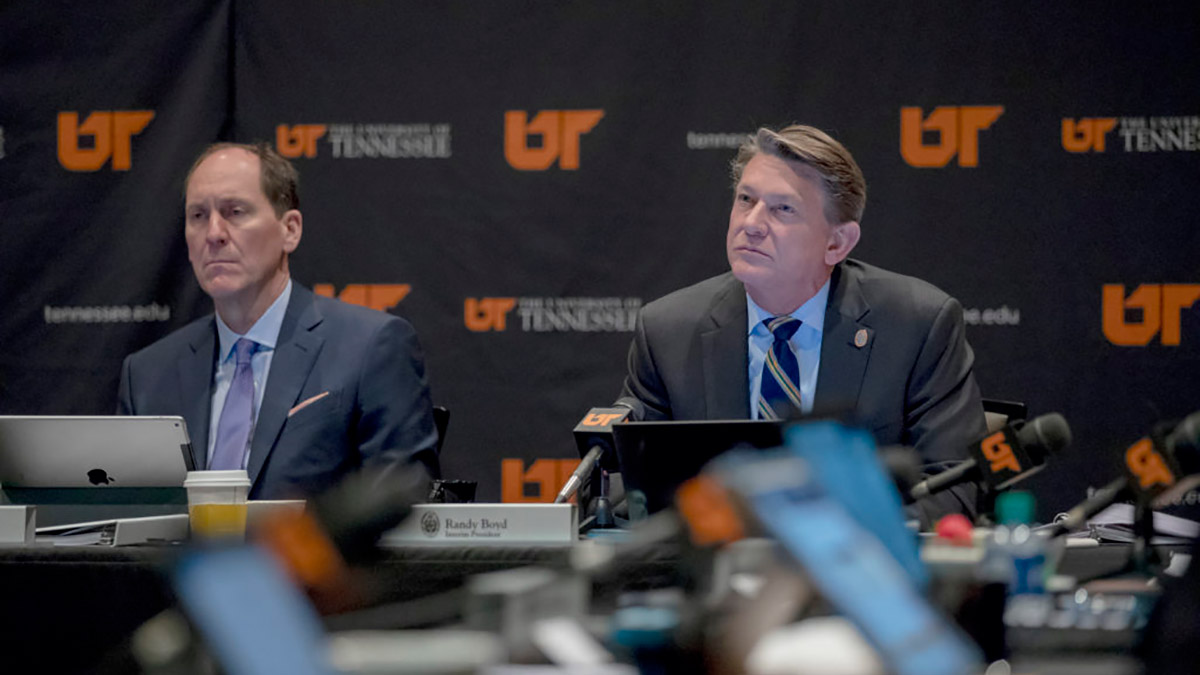
MARTIN – The University of Tennessee Board of Trustees began looking toward 2030 during its meeting Friday.
During the meeting held at the UT Martin, UT Board Chair John Compton said the board should begin a dialogue and working toward what the University needs to be successful in 2030.
“We all recognize the world is changing. There is transformation that could be coming to education,” Compton said. “That is what we should be considering in our meetings.”
Compton said the board needs to think strategically about what it would take to grow enrollment and graduate those students as well as to increase research that impacts the world. With UT graduating the majority students in the state, what happens at the University matters.
“If you want a strong state of Tennessee, we need a strong University of Tennessee,” he said.
Compton said it will take time to develop ideas and choose the best to pursue as a board.
“In the business world, I can look back on one or two decisions that mattered. There are one or two decisions that we could make that will materially matter,” Compton said. “If we get it right, it will materially matter for the good.”
Trustees agreed to continue discussions regarding working toward UT 2030.
“It’s a good time to do this,” said Trustee Amy Miles. “We have a new board. We have a new leader in Randy (Boyd, UT interim president). I’m glad we’re headed in this direction.”
During the meeting, trustees also discussed the State Comptroller’s Report on Sex Week at UT Knoxville, which was released in mid-February. The board approved eliminating student-organized programming, the Student Programming Allocation Committee and the opt-in process for fees. As part of that decision, the campus programming boards and registered student organizations will no longer receive student programs and services fee to organize programs. In the board meeting scheduled for June, the UT Knoxville administration will present a process of how it will decide what programming to fund, including sex education, with input from students.
“As an administration and board, we are completely supportive of the right of free speech and the First Amendment and the right of student programming, which is critical to the success of students at our University,” Boyd said.
Trustees approved a second year of no student tuition and fee increases for UT Health Science Center undergraduates. Since the Health Science Center’s academic year begins in July, the board considers its fee increases during its March meeting. Tuition and fees for the other campuses will be considered during the June meeting.
They also approved a $200 maintenance fee increase for graduate and professional programs. They approved reducing out-of-state tuition reduction for three programs: pharmacy, graduate health sciences and dental hygiene. UTHSC officials said the reduction would allow them to maintain and grow enrollment for those programs.
During the president’s report, Boyd discussed his Transparent UT initiative, which is geared toward providing easier access to information. In December, UT launched a dedicated website, https://tennessee.edu/transparency/, to provide access to the information in one location. He also established a Transparency Advisory Group to identify ways to increase transparency. The group consists of individuals from each campus, a student, a reporter and a former legislator.
“In our Transparent UT initiative, we’re making sure the things we’re proud of and what people want to know about us are easy to find,” Boyd said.
The board also approved a long-term ground lease for a private housing development at UT Health Science Center. Ken Brown, UTHSC executive vice chancellor and chief operations officer, said the almost 10-acre Memphis Medical District Apartments project would create 400 residences. He said quality housing close to campus was a concern with 90 percent of the campuses’ students coming from outside of the Memphis area.
The lease would allow the Henry Turley Company to plan, design finance and build the multi-family housing development. The company would pay the University ground rent. UTHSC students, faculty and staff would be allowed to rent residences as well as the general public.
In other business, trustees approved:
- Naming the UT Knoxville Center for Leadership and Service in honor of Clay and Debbie Jones.
- Amended bylaws to require the president to inform and seek the advice of the chair of the board and any appropriate committee chair before changing the compensation and employment terms of chancellors and other officers.
- Revised the standing rule on requests to address the board to allow one hour instead of 30 minutes.
- The process for campus advisory boards to provide recommendations to the president on the proposed strategic plans and annual operating budget, including tuition and fees, for campuses.
- The process for appointment of a non-voting student member of the board.
- The process for appointment of a faculty member to the Education, Research, and Service Committee.
- The UT Institute of Agriculture and UT Knoxville policies and procedures governing application for tenure before the sixth year of the probationary period.
- The UT Institute of Agriculture and UT Knoxville procedures for enhanced tenure-track review.
- Revisions to the UT Health Science Center Faculty Handbook on peer review of teaching and on relationships with students.
- New academic program of a Master of Science in Data Analytics at UT Chattanooga and Bachelor of Science in Information Sciences at UT Knoxville.
- The student code of conduct and proposed honor code for UT Chattanooga.
- The revised fiscal year 2018-2019 operating budget.
- Use of proceeds for renovation of the UT Conference Center in Knoxville for the UT Health Science Center Department of Audiology and Speech Pathology.
Contacts
Melissa Tindellmtindell@tennessee.edu
865-974-0741
Jennifer Sicking
jsicking@tennessee.edu
865-974-5179
